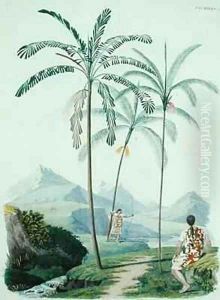D'Orbigny, Alcide Paintings
Alcide Dessalines d'Orbigny was a notable French naturalist, explorer, and paleontologist whose work significantly contributed to the scientific community in the 19th century. Born on September 6, 1802, in Couëron, near Nantes, France, d'Orbigny was deeply influenced by the rich natural environment of his childhood. He grew up in a period when the natural sciences were undergoing significant developments, and his early interest in the natural world set the stage for his future endeavors.
Educated initially in medicine, d'Orbigny's passion for natural history led him to shift his focus to the study of geology and paleontology. His extensive research and expeditions, particularly in South America from 1826 to 1833, were pivotal in his career. During his travels across Brazil, Argentina, Uruguay, Chile, Bolivia, and Peru, he collected an immense number of specimens across various natural history disciplines, laying the groundwork for his later contributions to paleontology and stratigraphy. His observations and collections from these travels were monumental in the development of the field of micropaleontology, particularly his work on foraminifera, microscopic single-celled organisms found in ocean sediments.
One of d'Orbigny's most significant achievements was the development of a detailed biostratigraphic scale based on the distribution of fossils. He introduced the concept of stages, a series of chronological divisions within the geological timescale, based on the presence of specific fossils. This work was crucial in establishing a more precise method of dating geological strata, which is still in use today.
Beyond his scientific contributions, d'Orbigny also played a vital role in the establishment of paleontology as a distinct scientific discipline in France. Upon his return to France, he was awarded the Chair of Paleontology at the Museum National d'Histoire Naturelle in Paris, where he continued his research and teaching until his death on June 30, 1857. His legacy includes a vast collection of specimens that continue to be valuable for research, as well as his influential publications, such as the monumental 'Voyage dans l'Amérique méridionale' (Travel in South America) and 'Paléontologie Française,' which remain key references in the field of paleontology.
D'Orbigny's work has left an indelible mark on the natural sciences. His contributions to our understanding of the Earth's history, the classification of fossil organisms, and the development of paleontological methods have cemented his place as one of the pioneering figures in the fields of paleontology and stratigraphy.
